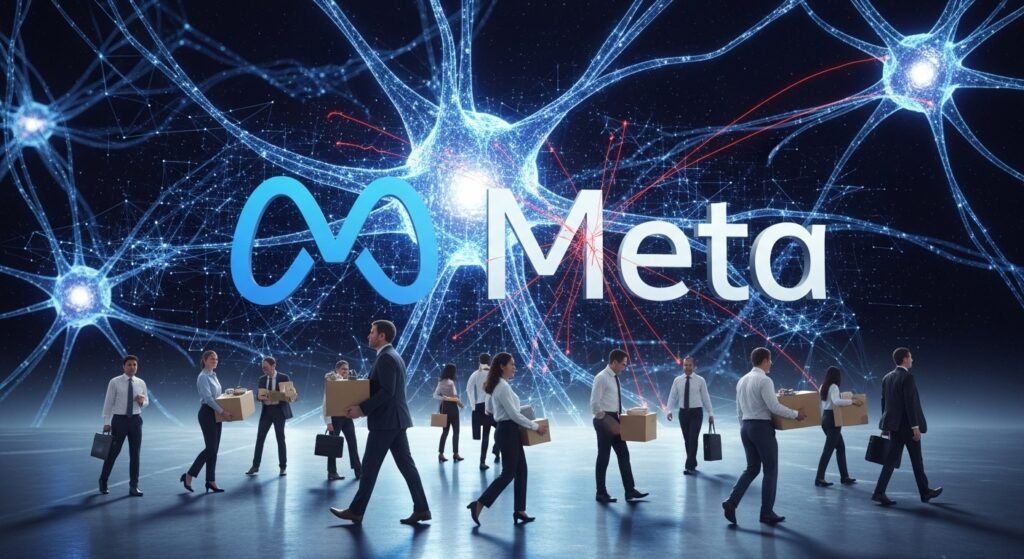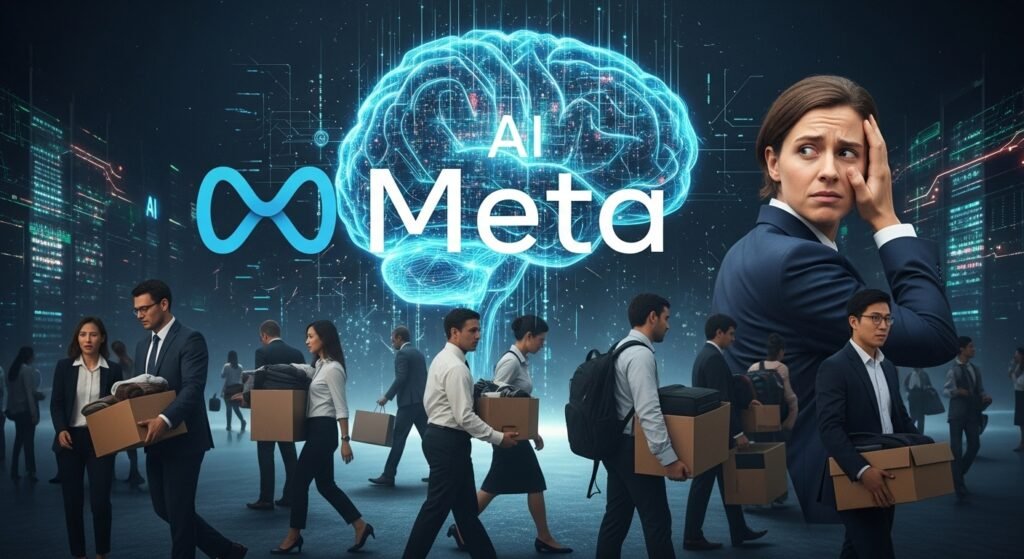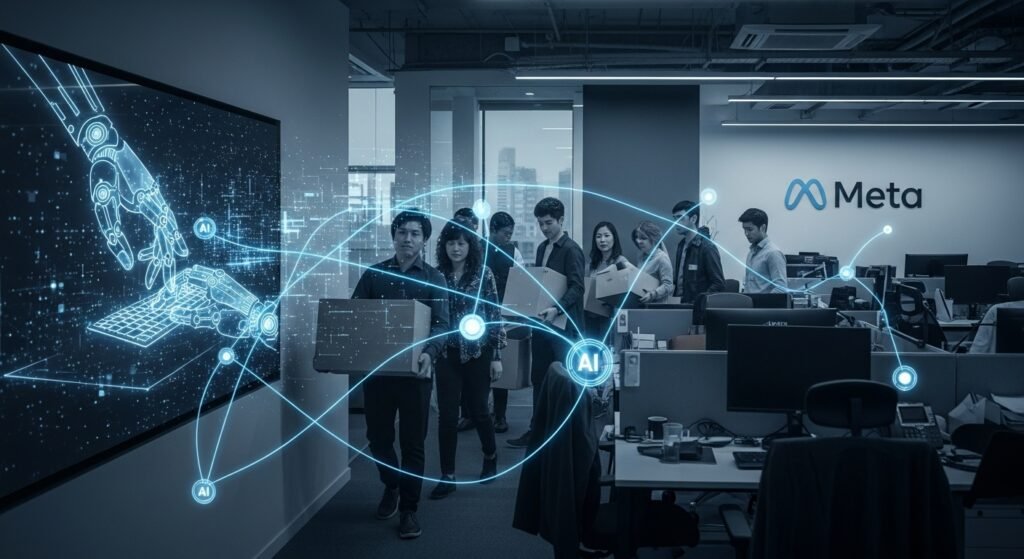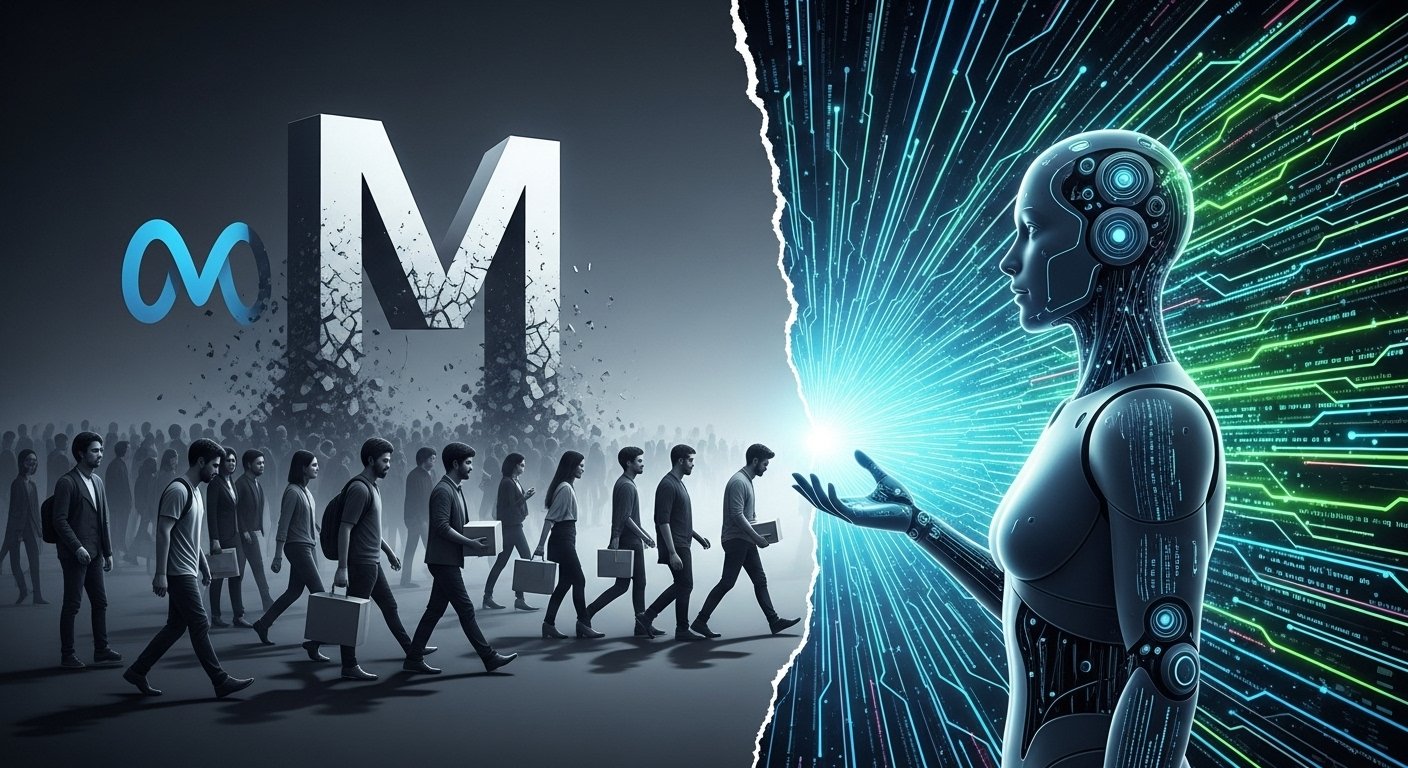Meta Layoffs AI: The past 24 hours have been remarkable for the world of artificial intelligence and technology. While OpenAI made headlines with its new browser agent Atlas, which can control web pages on your behalf, Google quietly unveiled a groundbreaking new product that could change the way developers build software.
Google’s “Vibe Coding” — Build Full Applications with Just a Prompt
Google introduced an innovative new tool built on top of Gemini, its advanced AI model. The platform lets users build complete web applications directly in the browser simply by describing what they want to create. From concept to production, it writes all the code automatically in real time.
Here’s how it works:
You select your preferred model (for example, Gemini 2.5 Pro) or click the “I’m Feeling Lucky” button, which randomly generates a new app idea. In one demonstration, it built a mobile-first wallpaper generator app that produced four AI-designed wallpapers based on a chosen theme — all completed in under 80 seconds.
Users can view and edit the generated code, restore previous checkpoints, preview on desktop or mobile layouts, and even deploy the app directly or save it to GitHub. Upcoming features will include database setup, authentication, file storage, and API tools, making this platform one of the most promising developments for AI-powered coding.

Unitree’s New Humanoid Robot: H2 Destiny Awakening
Unitree Robotics introduced its latest humanoid robot, the Unitree H2 Destiny Awakening, accompanied by an impressive demonstration video. The robot showcased advanced movement precision and smooth motion control, reinforcing Unitree’s reputation as one of the leading names in humanoid robotics. Notably, their robots are available for purchase, giving individuals and companies access to real, functional humanoid machines.
Zapier Launches Unified Copilot for AI Automation
Automation giant Zapier launched its Unified Copilot, a conversational AI interface that allows users to build automated workflows across thousands of apps simply by describing what they need.
The system understands context across your entire Zapier setup and can create complete automations involving Zaps, Tables, and Interfaces. It also includes “human-in-the-loop” checkpoints for verification before execution. With more than 8,000 integrations — including new partners such as Perplexity, Mistral, and Cursor — Zapier’s Unified Copilot makes AI-driven workflow automation easier and more accessible than ever.
Gemini 3.0 Rumors: Orion Mist and Lithium Flow
Speculation around Google’s Gemini 3.0 models is rapidly growing. Early reports suggest that two versions, Orion Mist and Lithium Flow, have quietly appeared inside LM Studio for internal testing.
Users who have seen early builds describe them as highly advanced, offering modern web UI generation, improved 3D rendering, and more realistic visual outputs. Demonstrations included AI-generated voxel cities and short animated scenes, hinting at a major step forward in AI-based visual and creative tools.
Apple’s M5 Chip: The Next Step in AI Hardware
Apple also made major news by launching its new M5 chip, calling it “the next big leap in AI performance for Apple Silicon.”
The M5 offers up to four times faster GPU compute performance for AI workloads compared to the M4, alongside a more powerful CPU, a next-generation neural engine in every core, and increased memory bandwidth.
This chip now powers the MacBook Pro (14-inch), iPad Pro, and Apple Vision Pro, confirming Apple’s strong focus on on-device AI capabilities. While Apple still trails in AI software innovation, its hardware is fully optimized for future machine learning and inference applications.
Tencent’s Hunyuan World 1.1 — Open-Source 3D World Model
Tencent released Hunyuan World 1.1, an open-source model for 3D reconstruction and world simulation. This upgraded version supports video-to-3D and multi-view-to-3D generation, enabling users to create detailed 3D environments from simple input sources.

The model’s open weights make it available for public experimentation, supporting research in 3D modeling, gaming, and simulation technologies.
Andrej Karpathy on the Limitations of Current AI
In a recent interview, AI researcher Andrej Karpathy offered a grounded perspective on the current limitations of large language models (LLMs). He emphasized that today’s models still lack key components of human cognition, such as memory, emotion, and true reasoning capabilities.
According to Karpathy, LLMs are excellent imitators but struggle to generalize beyond their training data. He compared them to the human brain’s cortex, noting that while they can replicate pattern recognition, they lack systems equivalent to memory and motivation centers like the hippocampus or amygdala.
However, many experts argue that these limitations are being addressed through improvements in model scaffolding, tool use, and memory integration — suggesting that AI will continue to progress rapidly over the next decade.
Google’s Quantum Computing Breakthrough
Google announced a major quantum computing milestone through its Willow chip, achieving the first-ever verifiable quantum advantage.
According to CEO Sundar Pichai, the new Quantum Echoes algorithm ran 13,000 times faster than the best classical algorithm on a supercomputer. This advance could have significant implications for drug discovery, materials science, and atomic-level simulations.
The breakthrough was published in Nature and confirmed by independent experiments, marking one of the most significant steps toward practical quantum computing applications.
Meta Restructures Its AI Division
Finally, Meta has begun reorganizing its long-standing FAIR (Fundamental AI Research) division under new AI chief Alexander Wang. The restructuring includes several hundred role reductions but aims to create a more agile and streamlined operation.
According to an internal memo, Meta wants to reduce bureaucratic layers and give individual engineers more ownership and decision-making power. Most affected employees are expected to transition into other AI-related roles within the company’s newer divisions.

Conclusion
From Google’s instant app generation to Apple’s powerful new AI chips, from Unitree’s humanoid robots to breakthroughs in quantum computing, the pace of innovation across the tech industry is accelerating faster than ever.
While experts like Karpathy remind us that true intelligence still lies ahead, the tools and platforms unveiled this week show that the foundation for the next era of computing is already being built.
